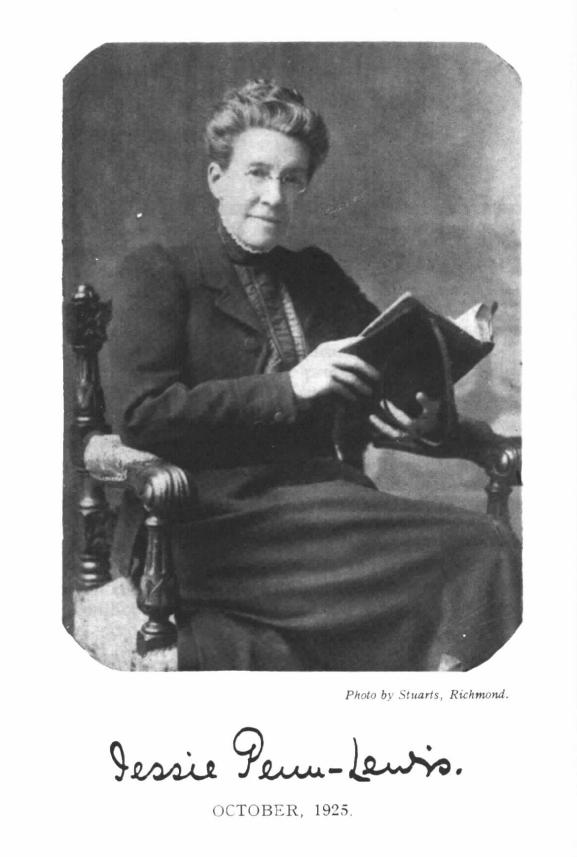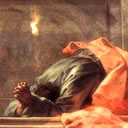Jessie Penn-Lewis
 “All that I have, all that I am, all that I may be is Thine, wholly, absolutely, and unreservedly,” wrote Jessie on her twenty-third birthday, “and I do believe that Thou dost take me, and that Thou wilt work in me to will and to do Thy good pleasure. Day by day draw me nearer.” What awesome words for a twenty-three year old young women!
“All that I have, all that I am, all that I may be is Thine, wholly, absolutely, and unreservedly,” wrote Jessie on her twenty-third birthday, “and I do believe that Thou dost take me, and that Thou wilt work in me to will and to do Thy good pleasure. Day by day draw me nearer.” What awesome words for a twenty-three year old young women!
Such strong heart-longings after God as were these characterized Mrs. Penn-Lewis' entire walk with Him. This is doubtless the reason why she appeared to enter more deeply into the mysteries of the Lord than any of her women contemporaries. While there were indeed spiritual crises in her life, her insatiable desire to know God better and better led her on and on into the deeper meaning of the Cross. But we cannot fully understand this remarkable woman, without becoming acquainted with her background and early life.
Jessie Jones was born February 28th, 1861, in Neath, South Wales. Her father, a civil and mining engineer, was the son of a prominent minister of the Calvinistic Methodist body. Her mother was the daughter of a business man who had married a girl of noble birth. Jessie was the second of six children born into the happy household.
She was endowed with a tremendously active brain set within a very frail body. At nine months, she just got up and walked, and continued from that day to be active on her feet. Her parents were warned by the doctor not to teach this precocious (advanced) child anything as an over-active mind was her physical enemy. She, however, taught herself to read, learning the alphabet from papers and books around the home. By the time she was four, she could read the Bible freely.
For reasons of health, a normal school life was denied her. When she was eight years of age she was permitted to go away to boarding school, and then only for three months. The remainder of the year was spent in outdoor wanderings on the farm or in the near by mountain foothills. When she was ten, it was thought advisable to extend the schooling period, but her health could not stand the rigors of school life, even under the most loving and careful overseeing. It was at this point that she realized the great handicap that was hers for life.
When Jessie was nine, Mr. Jones leased an old museum where he had already had his offices for some years. Now it became home to his large family. The attic in the old tower, where ivy clung and birds sang, was a happy playroom where books, books, and more books were everywhere in evidence. The home was enlivened by frequent visits from prominent ministers of the Calvinistic Methodists.
At twelve years old, Jessie helped her mother in the modest work of the town. When she was sixteen, the dearly loved father was taken from them by death. Although he had been successful as a consulting engineer to many of the colliery companies of South Wales, he had not been a good business man. Consequently, his window, to educate the children, found it necessary to go into business, and the old museum became both workshop and home.
A genuine love-match culminated in marriage for Jessie at nineteen years of age. Before the event, however, one of her brothers felt he should warn her fiance` that he was undertaking the care of an invalid for life! This knowledge, however, did not deter the young man from his purpose, and the young couple, after the wedding, made their home in Brighton, where Mr. Penn-Lewis became auditor's clerk for the County of Sussex.
They had been married for eighteen months when the subject of the Lord's return deeply concerned the young wife. She sought God and, without any human aid, was converted on New Year's Day, 1882. Two verses from the Bible were applied to her heart by the Holy Spirit: “The Lord hath laid on him the iniquity of us all . . .” and “He that believeth hath everlasting life.” She later declared that, as her faith responded, “The Spirit of God instantly bore witness with my spirit that I was a child of God, and deep peace filled my soul. The new life bore fruit.” She knew without a doubt that her life had been changed, she saw fruit in her life of salvation and redemption. She had a constant awareness of God's hand in her life.
A new appointment for her husband as a territorial accountant demanded a move to Richmond, Surrey. Here they enjoyed spiritual fellowship under the ministry of Rev. Evan Hopkins, who was then preaching at Holy Trinity Church. Both husband and wife were deeply impressed by the spiritual depth of his teaching, which included that of “victory over besetting sins”. His first sermon was to Mrs. Penn-Lewis “an opening of Heaven.”
One day, Mrs. Hopkins (wife of Rev. Hopkins) pointedly asked Jessie, “Have you victory over sin?” She could only answer negatively and confess that she had never heard of the possibility of such a conquest.
On her twenty-third birthday Mrs. Penn-Lewis wrote out a dedication of her life to God. God took her at her word and through varying circumstances and providences answered her prayer by faithfully leading her on. Her diary entry on New Year's Day, 1886, says: “Thank Go, I commence the year 'right with Him,' but I long intensely to be more single-eyed to His glory, my more lost in His.” Other entries read:
A day of constant temptation and battle against a discontented grumbling spirit. Was enabled to hold on all through in spite of darkness. Gave way once or twice to hasty speaking . . . Felt ruffled again this morning. When shall I learn peace and the love that endureth all things and is not easily provoked! . . . Happy day, no cloud, but conscious presence and smile of the Lord. Oh, why do I not trust Him more utterly in times of temptation?
Her husband, at this time, in answer to her many prayers, became a decided Christian and united with her in witnessing for the Lord to others. She couldn't have had a better partner. She blessed the day when her prayers for her beloved husband where met.
October 14, 1886, Mrs. Hopkins opened a new branch of the Y.W.C.A. (The largest and oldest women's organization in the United States. The YWCA represents more than one million women, girls and their families). At Richmond is where Jessie found God's niche for her life for next years to come. By being led by the Spirit throughout her daily life, the Spirit had led her to the next chapter of her walk with the Lord.
The year 1889 was one of illness, and diary entries reveal the struggle she had with pleurisy (The thin serous membrane around the lungs and inner walls of the chest, causing a burning, inflamed pain), a lung diseasee which reduced her in weight to under ninety-eight pounds. She did not, however, allow this to lessen her labors, except on all this she was sounding out, “the depths and heights that I know nothing of, but I know that my face is 'set like a flint' to press on to fullest blessing.”
A book by Andrew Murray, The Spirit Of Christ, brought her a clearer vision concerning the work of the Holy Spirit, as well as the utter insufficiency and hopelessness of the efforts of the flesh. Commenting on the effects of this book upon her, she wrote:
“I saw that I should know the Holy Spirit as a Person. So I took Him as the gift of Christ, as simply as I first took the Lord Jesus as my Savior. I well remember the deep peace, the fellowship with God, the communion of the Holy Ghost, and the fruit of the Spirit in love, joy, and peace which followed. But I could not understand why it made so little difference in my service. It did not deliver me from shrinking inability to speak boldly for Christ, nor give me power for aggressive service.”
It was three years later that Mrs. Penn-Lewis was to see that there was a power in the Spirit for service which meant crucifixion and deliverance from the fear of man. In her increasing physical disability she came to realize that she could actually exchange her weakness for God's strength. The “same Spirit that raised Jesus from the dead could also quicken her mortal body”. She took the scripture at It's literal word.
In March, 1890, she was made Honorary Secretary of the Richmond branch of the Y.W.C.A. Public speaking was a sore trial. Although many would have been satisfied with the fruit they saw, but Mrs. Penn-Lewis could not. She compare them with the fruit given to the apostles at Pentecost. She wrote:
“Self-consciousness almost paralyzed me and no practice ever made speaking so difficult . . . Everyone I heard of who knew anything about the Holy Spirit, I asked to come and speak to my girls . . .”
“How full my Bible was of notes, and how carefully I prepared a dish of spiritual food for them! “Food,” all obtained second-hand from other books . . . but they did not change much in their lives. I thought it was the fault of the girls, until the Lord spoke to me and said, “It is yourself!” Any good leader always assumes the responsibility upon themselves until God shows them otherwise.
“But, Lord I am consecrated! What can it be in me? I give time every morning to read and pray: I have put everything right in my life as far as I know.” A much common prayer of today's church folk.
But the Lord still said, “It is YOU.” “And then He began to break me, and there came to me the terrible revelation that every bit of this activity, this energy, this indomitable perseverance, was myself after all, though it was hidden under the name of “consecration”. God help us to see such a revelation!
 There is a voice of Truth which can be heard crying out! Whether lost or saved, we believe you will meet the living Christ through this ministry.
There is a voice of Truth which can be heard crying out! Whether lost or saved, we believe you will meet the living Christ through this ministry.